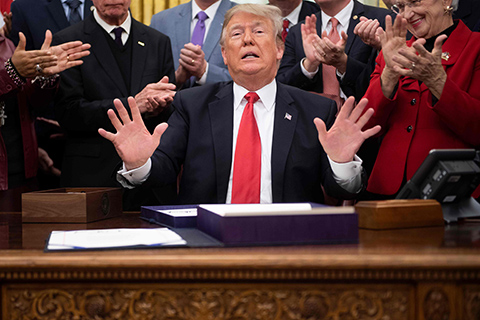
WASHINGTON: An
air of chaos enveloped Washington yesterday as the US government kicked off the
holidays by partially shutting down, following the failure of leaders to pass a
federal spending bill as negotiations stalled over Donald Trump's demand for
money to build a US-Mexico border wall. Operations for several key agencies
ceased at 12:01 am yesterday (0501 GMT), despite last-ditch talks that
continued on Capitol Hill between White House officials and congressional
leaders in both parties.
Most critical
security functions remain operational but 800,000 federal workers are impacted,
with many furloughed just days before Christmas while others deemed essential
are working unpaid. And as many other Americans and tourists began vacations
head of end-of-the year holidays some national parks have shuttered completely,
while others remain open but without any visitor services including restrooms
and maintenance. New York's governor provided funding to the Statue of Liberty
monument and Ellis Island so those key attractions could remain open.
The budget
wrangling and subsequent shutdown - the third in a year - cast a dark cloud
over the US capital already reeling from Defense Secretary Jim Mattis' resignation
announcement Thursday. The uncertainty pushed Wall Street into a third straight
rout on Friday, to end its worst week since late 2008 at the start of the
global financial crisis. "President Trump threw a temper tantrum and
convinced House Republicans to push our nation into a destructive Trump
Shutdown," Chuck Schumer, the top opposition Democrat in the Senate, and
his House counterpart, fellow Democrat Nancy Pelosi, said in a joint statement.
Trump has dug in
on his demand for $5 billion for construction of a wall to curb illegal
immigration on the US border with Mexico. Democrats are staunchly opposed, and
the absence of an elusive deal means federal funds for dozens of agencies
lapsed at midnight Friday. The House of Representatives and the Senate were due
back in session at noon yesterday. But it remains unclear how long the shutdown
will last, with Washington unable to accomplish one of its most basic tasks -
keeping the government up and running.
"This is a
dereliction of duty by Congress and the president," said David Cox,
national president of the American Federation of Government Employees. Trump
voiced hope late Friday that it "will not last long" - after earlier
saying he was ready for just that. His own Republican party still controls both
the House and Senate, but in January the House comes under Democratic control.
Governor Ralph
Northam of Virginia - a state bordering the US Capitol that is home to many
federal workers - urged Trump in a letter Saturday to push immediate action to
end the shutdown, saying it "inflicts real harm" on workers. "I
share your desire for strong economic growth throughout the United States, but
the current partial government shutdown makes it harder to achieve this
goal," the Democratic governor said.
About
three-quarters of the government, including the military and the Department of
Health and Human Services, is fully funded until the end of Sept 2019, leaving
25 percent unfunded as of yesterday. Most NASA employees will be sent home, as
will Commerce Department workers and many at the Departments of Homeland
Security, Justice, Agriculture and State. "It's up to the Democrats
whether or not we have a shutdown tonight," Trump said earlier Friday,
blaming his political opponents for the crisis. "I hope we don't,"
the president added, but "we're totally prepared for a very long
shutdown."
Should they
eventually strike a deal, it could swiftly clear Congress and reach the
president's desk, said Senate Republican Bob Corker. One focus of discussion
was the $1.6 billion in border security funding that was a part of pending
Senate legislation, number two Senate Republican John Cornyn told AFP. But
conservatives in the House would likely balk at that figure. "There's no
agreement," congressman Mark Meadows, chairman of the House Freedom Caucus
of ultraconservatives, told reporters as he left a closed-door meeting on the
Capitol's Senate side. "There's a whole lot of numbers being thrown
around," but a maximum $1.6 billion for border security "is not
acceptable".
Trump reversed
course Thursday and rejected a measure that had unanimously passed the Senate
and was under House consideration. It would have extended government funding
until Feb 8, but contained no money for a border wall, a pet project Trump has
fought for since his presidential campaign. Democrats painted Trump as the
Grinch who stole the year-end deal. With lawmakers like Meadows and prominent
conservative commentators demanding that the president stick to his campaign
promises, Trump would not budge on his wall. The House swiftly passed a bill
that fulfilled the president's demands. It included $5.7 billion in wall
funding, and $7.8 billion in disaster relief. But it stalled at the first
hurdle in the Senate. Trump was scheduled to fly to Florida Friday for his
Christmas break, but he postponed the trip. - AFP










